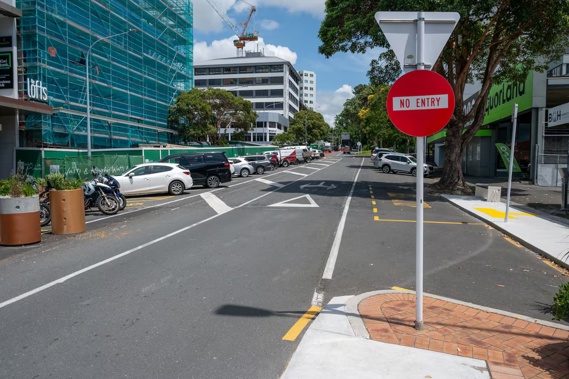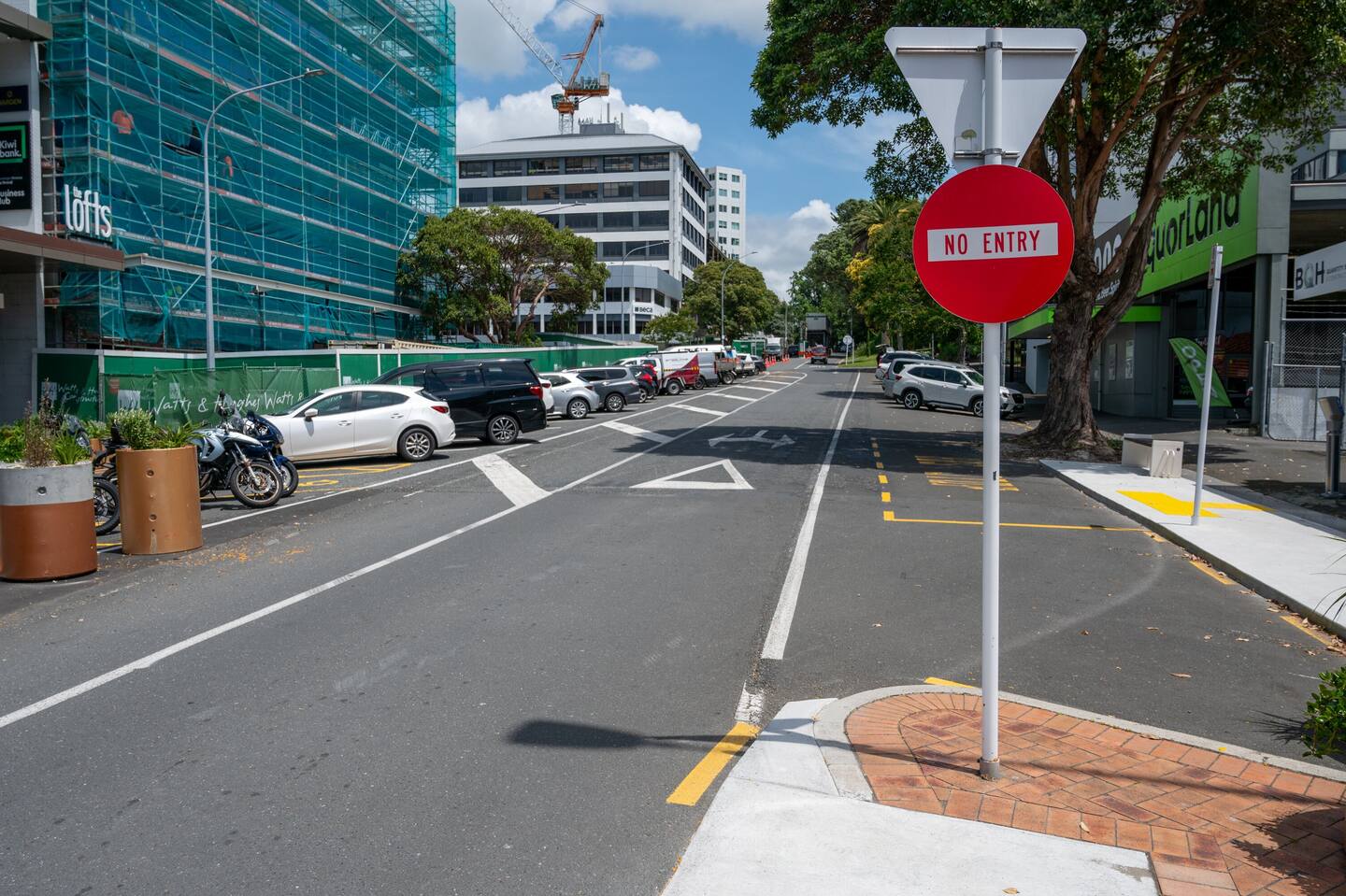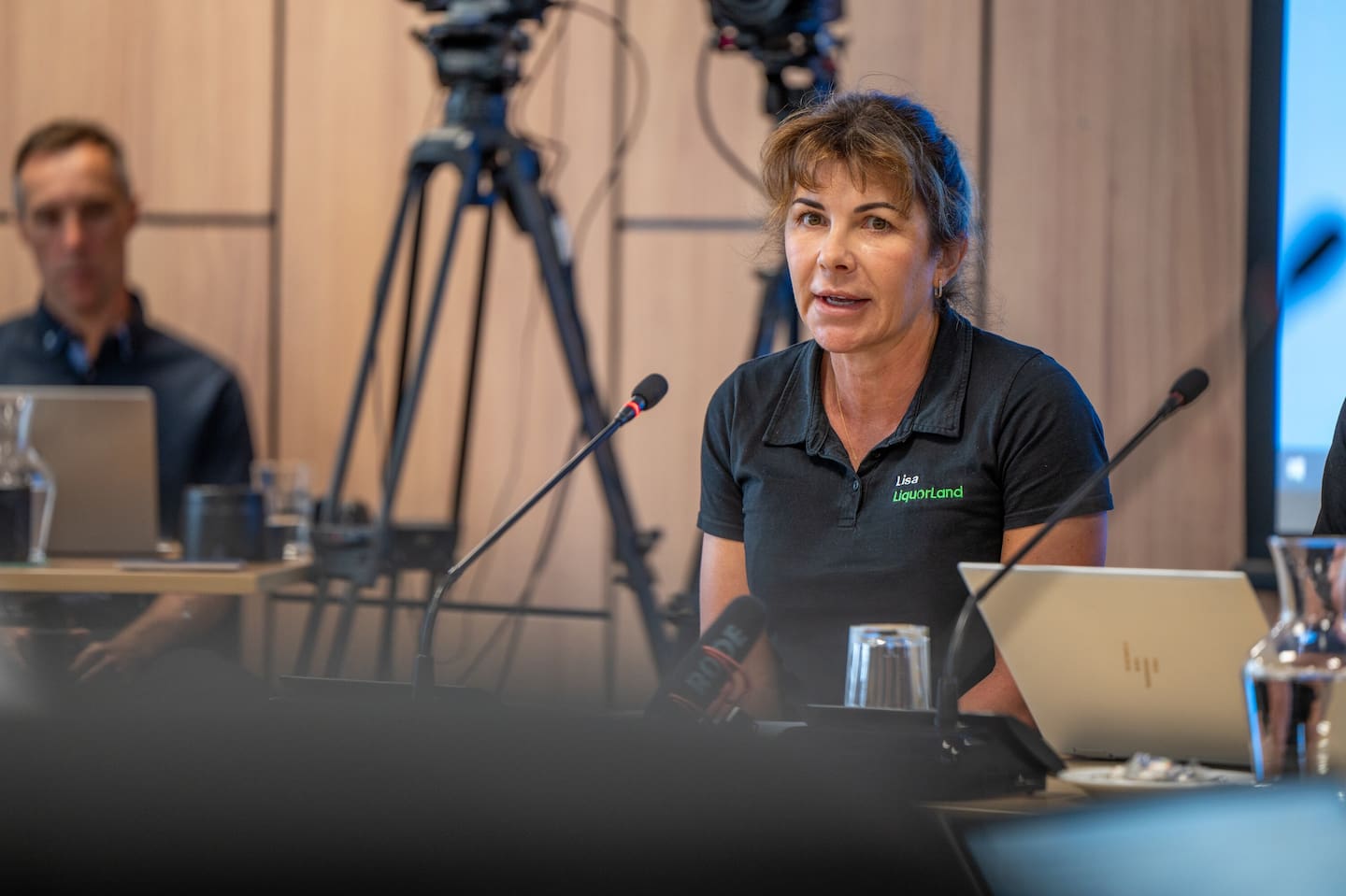

Tauranga business owners say sales have dropped because of a new road layout and one fears she’ll have to shut her store.
Lisa Parker owns Liquorland on Harington St in Tauranga’s city centre. In March, the lower end of the street became one-way because of nearby construction and, the city council said, to increase safety and streamline traffic.
There were also changes to other roads in the CBD as part of a two-year trial while construction of the $306 million civic precinct Te Manawataki o Te Papa and other private developments were ongoing.
Parker presented a petition, signed by nearly 150 people, at a Tauranga City Council meeting on Tuesday calling for lower Harington St to return to two-way traffic.

Liquorland Harington St owner Lisa Parker says sales at her Tauranga business have dropped by a third since changes to the road layout changes. Photo / David Hall
She said sales at her store had dropped by more than a third since the road became one-way.
“The business is no longer viable yet I have two years left on my lease with the added costs of rates, insurance, et cetera for the building.”
The decline in sales was directly linked to the street becoming one-way, Parker said.
There was a “considerable backlash” from customers about the changes and they vented their anger to staff daily, she said.

Harington St in Tauranga's city centre became one-way in March 2024. Photo / David Hall
Parker said she had permission from the franchisor to close in February next year but she would still have $200,000 in lease obligations.
If the street was to return to two-way it would mean a lot to her customers, enable her to remain open and her staff could keep their jobs, she said.
Mohammad Rahman bought Cafe on The Strand 18 months ago and told Local Democracy Reporting his sales were down 20% to 30% since the road changes.
The biggest impact was the bus stop, which removed the parking that was directly in front of his cafe on the corner of Harington St and The Strand, he said.
Rahman said customers complained about the lack of parking and the cost of it, said Rahman.
New development in the city would improve things but right now his business needed to survive, he said.
“I’m losing business at the moment and I have to survive. It’s really hard for me.
“What the council is doing might be better in the future but at the moment I’m struggling.”

Liquorland owner Lisa Parker presented a petition to the council to return Harington St to a two-way street. Photo / David Hall
Speaking at the meeting, Parker said another issue her business faced was people drinking at the recently installed bus stop in front of her store despite it being a liquor ban area.
The bus stop had seats and had tree shade so could be a place for people to hang out, she said.
“Customers and I are staggered the council would consider putting a bus stop outside a liquor store.
“That’s asking for trouble and we get that trouble.”
Staff picked up empty bottles and cans from outside the store and bus stop daily despite the liquor ban.
Parker said buses also parked across the driveway at times, which further deterred customers, and the issues created by the bus stop meant her liquor licence may not be renewed.

The owner of Liquorland on Harington St warns it could have its liquor licence revoked because of issues with a nearby bus stop. Photo / David Hall
Parker received an email from the police in June saying the amenity and good order of the CBD was decreasing so renewal of her liquor licence could be in jeopardy.
“Not only is my business in jeopardy because of lack of traffic and reduced sales, now I face the fact that my licence will not be renewed.
“We link that purely to the change in the road and the demographic that’s changed as a result.”
Store staff refused to sell to customers they saw drinking at the bus stop, Parker said.
“We appreciate and do not take lightly our privilege and responsibilities to sell alcohol.”
The store was open from 10am to 7pm, except on Friday and Saturday when it closed at 8pm.
The store should open earlier and close later for financial reasons but Parker said she kept those hours for the safety of her staff and the community.
Parker was told about the street changes in February and raised her concerns with the council, but these were “dismissed”, she said.

Deputy Mayor Jen Scoular says it is important to keep current businesses in the CBD going. Photo / Alisha Evans
Deputy Mayor Jen Scoular said it was important people were heard during consultation.
Harington St highlighted a situation where there was work under way to make the CBD the heartbeat of Tauranga, but the businesses already there needed to keep operating, said Scoular.
She asked if changes could be made to return lower Harington St to two-way.
General manager infrastructure Nic Johansson said it was possible and staff were looking at options that would be presented to the council in the new year.
Mayor Mahé Drysdale requested staff provide a report to the council about returning lower Harington St to two-way at its December 9 meeting.
Parker said after the meeting she was grateful the council had agreed to look at options for Harington St sooner.
If it returned to two-way and the public responded it might be in time to save her business, Parker said.

Downtown Tauranga manager Genevieve Whitson says businesses needed more time to digest the road layout changes. Photo / John Borren
Downtown Tauranga manager Genevieve Whitson agreed the bus stop was negatively impacting Liquorland because it took up a lot of space and limited access to the store when traffic backed up.
Feedback from CBD businesses was the one-way traffic system was an adjustment, but for the most part, they were now used to it, Whitson said.
Downtown Tauranga supported the transformation of the city centre but did not support the speed and pace at which the one-way traffic system was implemented, she said.
The businesses needed more time to digest the changes and give feedback, which could have alleviated some of the challenges that arose on lower Harington St, Whitson said.
“We really hope that the council involves businesses in the process when this pilot scheme is reviewed to ensure we get the best outcome for all parties involved.”
- LDR is local body journalism co-funded by RNZ and NZ On Air.
Take your Radio, Podcasts and Music with you








